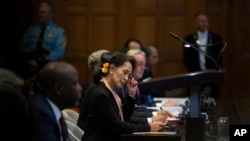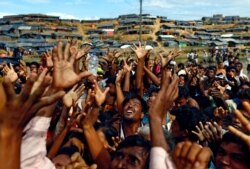The International Court of Justice opened a historic three-day hearing Tuesday into accusations of genocide brought against Myanmar over the military's brutal 2017 crackdown against the Rohingya Muslims.
The hearings are based on a lawsuit filed last month at the United Nations-sponsored court in The Hague by the small West African nation Gambia, on behalf of the 57-member Organization for Islamic Cooperation. Gambia is accusing Myanmar of violating the 1948 Genocide Convention.
More than 700,000 Rohingyas fled across the border into Bangladesh in August 2017 to escape a scorched earth campaign launched by the Myanmar military in response to attacks on security posts by Rohingya militants in western Rakhine state. A U.N. investigation concluded the campaign was carried out "with genocidal intent," based on interviews with survivors who gave numerous accounts of massacres, extrajudicial killings, gang rapes and the torching of entire villages.
"All that The Gambia asks is that you tell Myanmar to stop these senseless killings, to stop these acts of barbarity" Gambian Justice Minister Abubacarr Tambadou urged the court in an opening statement.
Myanmar will be defended at the IJC by de facto leader Aung San Suu Kyi in her official role as foreign minister. She is expected to reiterate her government's claim that the military was targeting Rohingya militants when she addresses the court on Wednesday.
Aung San Suu Kyi won the Nobel Peace Prize in 1991 for her pro-democracy stand against Myanmar's then-ruling military junta, which placed her under house arrest for 15 years until finally freeing her in 2010. But her defense of the military's actions against the Rohingyas has wrecked her reputation among the international community as an icon of democracy and human rights.
The Rohingya were excluded from a 1982 citizenship law that bases full legal status through membership in a government-recognized indigenous group. The Myanmar government considers the Rohingya illegal immigrants from Bangladesh, effectively rendering the ethnic group stateless.






